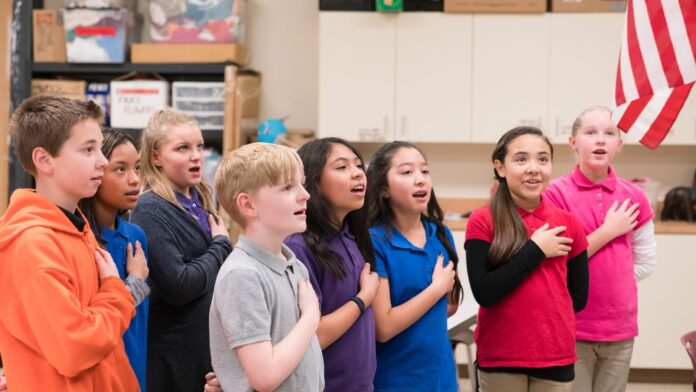As did many others in my neighbourhood, I was ready to fly the American flag on Friday, when our nation celebrated its big birthday. I live in New England, where the Fourth of July is a big event. Twenty-odd kids from this neighborhood form an honor guard, which parades briefly before laying a wreath on a small war monument. After singing the National Anthem, we raise the flag and recite our pledge of allegiance. A respected local then addresses us. We haven’t yet informed the ACLU of our plans, so we invited a friendly cleric who could perform a blessing.
This patriotic exhibition seems outdated by today’s standards. The event has always been moving and thought provoking to me. It makes me feel lucky to be American and reminds me how extraordinary the political genius was that made America, as Lincoln put it in a fraught time in 1862 “the last and best hope of Earth.”
In preparation for the holidays, I dusted my copy of Making Patriots, by the late political philosophy Walter Berns (1919 – 2015). I am glad I did. This short, eloquent work is a beautiful tribute of patriotism. It is currently a virtue that is under attack (though Donald Trump has done a great job to save it). Berns starts by pointing out that, although Lincoln’s words ring truer today than ever before, patriotism, which Lincoln believed was essential to guaranteeing liberty, is no longer widely supported, at least not among the elites of this country.
Lincoln is the Making Patriots hero, partly because the patriotism that he preached has been threatened by an increasingly unmaking patriotic culture. There are many versions of the annual event in my neighborhood that take place across the U.S. with a special focus on areas where the MAGA movement is strong. There are other forces that undermine or ridicule patriotic sentiment in our society.
Many people are misled by the statement that Samuel Johnson made that “patriotism was the last refuge of an scoundrel.” However, Johnson meant to criticize “a genuine and generous love for our country,” not just “pretended patriotism,” which is “a cloak of self-interest.”
Making Patriots provides an antidote for the poisonous anti-patriotism of casual antisemitism. It reminds us of the fact that freedom without patriotism will not last long. Berns does not advocate blind allegiance to the flag or country. He says that Stephen Decatur, who made the famous toast in 1816 to “our nation, right or incorrect”, could be accused of not being American because he substituted unthinking chauvinism with reasoned commitment.
Making Patriots devotes a large portion of its content to explaining the uniqueness of the American concept. The stories of the bravery and valour of ancient Spartans are told to every schoolboy. Their mothers would tell them to bring their shields back from battle or to wear their shields. American patriotism is different than the Spartan kind and even the one displayed by ancient Athens. It’s a more commercial, democratic country that in many ways appeals to modern tastes.
The foundation of American patriotism does not lie in a place, but rather in a principle. Berns points out that the word “fatherland” does not appear in our patriotic lexicon because we are not loyal to our homeland (the Latin “nasci“, “to be birthed”), but to the freedom-loving ideas that drive it. America is a paradoxical “nation” made up of immigrants from all over the world. Berns argues that the principles of liberty, popular sovereignty and democracy, as articulated in documents such as The Federalist Papers and the Constitution gave birth to “an entirely new” understanding of patriotism. This permanent novelty is commemorated by the “novus orderdo seclorum” —“a New Order of Ages”– inscribed on our money.
We must rely heavily on the educational institutions in order to instill patriotism in our children. Noah Webster was speaking for many people when he stated that “every American child should be familiar with their own country” not only its history and geography, but also its principles and “illustrious leaders and statesmen”.
Webster’s high-minded mandate was, however, steadily eroded throughout the 20th century. The Founders of America insisted that church and state be separated, but Berns notes that they also “intended to encourage religious belief while they tried to discourage religious fanaticism”. Over the years, legislators and courts have conspired to undermine moral and civic education, which nurtures patriotic citizenry. In 1991, for example, Florida passed a law requiring that public schools teach that “no culture is intrinsically inferior or superior to another.” Berns argues that this was the equivalent of telling immigrants from Cuba and Haiti to stay home.
In the past, the purpose of civics classes was to teach respect for the principles which formed America. Berns says that the question is now whether the private sector can pick up the slack. Patriotism is a benefit to all of us. This profound book challenges us to reflect on whether we are still doing the necessary work of creating patriots.
NEWSLETTER SIGNUP
Subscribe to our newsletter! Get updates on all the latest news in Virginia.


